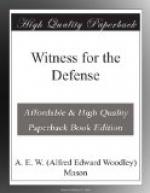“Is that a village?” he asked.
“No, Sahib,” replied the bearer. “That’s his Excellency’s camp.”
“What!” cried Thresk, swinging round upon his heel.
His bearer smiled cheerfully.
“Yes. His Excellency to whom I carried the Sahib’s letter. That’s his camp for to-night. The keeper of the bungalow told me so. His Excellency camped here yesterday and goes on to-morrow.”
“And you never told me!” exclaimed Thresk, and he checked himself. He stood wondering what he should do, when there came suddenly out of the darkness a queer soft scuffling sound, the like of which he had never heard. He heard a heavy breathing and a bubbling noise and then into the fan of light which spread from the window of the bungalow a man in a scarlet livery rode on a camel. The camel knelt; its rider dismounted, and as he dismounted he talked to Thresk’s bearer. Something passed from hand to hand and the bearer came back to Thresk with a letter in his hand.
“A chit from his Excellency.”
Thresk tore open the envelope and found within it an invitation to dinner, signed “Stephen Ballantyne.”
“Your letter has reached me this moment,” the note ran. “It came by your train. I am glad not to have missed you altogether and I hope that you will come to-night. The camel will bring you to the camp and take you back in plenty of time for the mail.”
After all then the quest had not failed. After all he was to see for himself—what a man could see within two hours, of the inner life of a married couple. Not very much certainly, but a hint perhaps, some token which would reveal to him what it was that had written so much character into Stella Ballantyne’s face and driven Jane Repton into warnings and reserve.
“I will go at once,” said Thresk and his bearer translated the words to the camel-driver.
But even so Thresk stayed to look again at the letter. Its handwriting at the first glance, when the unexpected words were dancing before his eyes, had arrested his attention; it was so small, so delicately clear. Thresk’s experience had made him quick to notice details and slow to infer from them. Yet this handwriting set him wondering. It might have been the work of some fastidious woman or of some leisured scholar; so much pride of penmanship was there. It certainly agreed with no picture of Stephen Ballantyne which his imagination had drawn.




